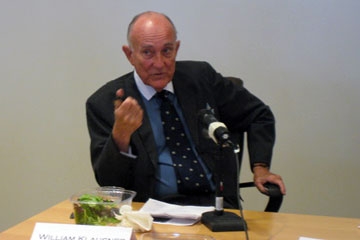No End in Sight for Thai Political Conflict

SAN FRANCISCO, June 14, 2010 - Over 1,800 people were wounded and some 88 killed during the violent protests that broke out in Bangkok, Thailand in March and continued into May. Speaking before Asia Society Northern California, renowned expert on Thai society and politics William Klausner argued that the recent turmoil is the result of many unresolved tensions in Thai society—and that despite assurances from the current Thai government, continued conflict seems almost inevitable.
Klausner delivered his sobering message in a talk on the roots of the Thai political crisis and on obstacles to peace. In Klausner's view, the anti-government grievances of the Red Shirt protestors—the mostly rural poor of northern Thailand—stem from various social changes in rural life, and a new sense of political awareness awakened by former prime minister Thaksin Shinawatra, exiled in a military coup in 2006. A barter economy has given way to a globalized market economy, and rural Thais are more educated and politically savvy than ever before.
Yet Klausner cautioned his audience to think of the Red Shirts as a diverse and multi-vocal group, rather than a monolithic one. He particularly emphasized what he sees as the division between the Red Shirt leaders and the rank and file. According to Klausner, Red Shirt leaders have framed the relationship between the rural poor and the urban elites as a zero-sum game of naked class conflict. Most rural Thais, he argued, are less interested in abstract political ideas than in securing a "bigger piece of the pie"— greater material gains that would put them on the road to the urban middle-class lifestyle.
Klausner is particularly concerned by the disappearance of an effective political center.
Third-force centrist parties, he argued, have been conspicuous by their silence. Such centrist check and balance forces as the NGO community and even the Buddhist Sangha authorities have left the stage to the zero sum gamers. The short-lived "Pink Shirts," a self-proclaimed centrist faction, held just one small event before drifting into obscurity. The silence of moderate voices, combined with the extreme rhetoric on both sides, Klausner said, mean that there is little prospect for political reconciliation. "Until centrist forces get back in the game ... I just see more of the same," he told his audience.
The recent political violence has called into question the narrative of Thailand as one of Southeast Asia's great political and economic success stories. The stable Thailand of the past has changed beyond recognition, and there is no turning back. The streets of Bangkok may have returned to an uneasy peace and the Thai economy—so far—appears to be on solid ground, but the tensions that led to the protests remain fundamentally unchanged.
Reported by Katherine Duh